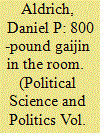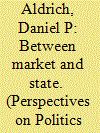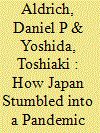|
|
|
Sort Order |
|
|
|
Items / Page
|
|
|
|
|
|
|
| Srl | Item |
| 1 |
ID:
092539


|
|
|
|
|
| Publication |
2009.
|
| Summary/Abstract |
Two ideographs make up the Japanese word gaijin, the first meaning "outside" or "out of place" and the second meaning "person." Hence gaijin literally means an outsider or foreigner, and in polite Japanese most speakers opt for the slightly less brusque sounding gaikokujin, which places the emphasis on the foreign nation (koku) from which the alien comes. But as political scientists doing fieldwork abroad, we are all foreigners, if not because of superficial differences such as pigmentation, accent, or dress, then because of our motivations and goals-gaining information, generating and testing hypotheses, and so forth. When we speak to informants abroad-whether in Japan, India, France, or elsewhere-to further our research, we may see ourselves as 800-pound gorillas who can bring conversations to a halt, generate unwanted propositions from nearby residents, and induce stares and pointing
|
|
|
|
|
|
|
|
|
|
|
|
|
|
|
|
| 2 |
ID:
154851


|
|
|
|
|
| Summary/Abstract |
Since the 3/11 compounded disasters, Japanese energy policy, especially its nuclear policy, has been paralyzed. After the Fukushima disasters, public opinion turned against nuclear energy while the central government continued to push for restarts of the many offline reactors. Based on nearly thirty interviews with relevant actors and primary and secondary materials, we use qualitative comparative analysis (QCA) and five case studies to illuminate the impact of conditions influencing reactor restarts in Japan after 3/11. We investigate which local actors hold the greatest power to veto nuclear power policy, and why and when they choose to use it. Key decisions in nuclear power policy involve approval from multiple institutions with varying legal jurisdiction, making vetoes the result of multiple actors and conditions. Certain legal and political factors, such as court, regulator, and gubernatorial opposition (or support), matter more than technical factors (such as the age of the reactor or its size) and other political factors (such as town council or prefectural assembly opposition or support). Local politics can stymie a national government’s nuclear policy goals through combinations of specific physical conditions and vetoes from relevant actors, rather than through the actions of local opposition or single “heroic” governors. Our findings challenge the assumption that utilities unilaterally accept a governor’s vetoes, but reinforce the notion that specific judicial and electoral veto players are blocking an otherwise expected return to a pro-nuclear status quo.
|
|
|
|
|
|
|
|
|
|
|
|
|
|
|
|
| 3 |
ID:
105369


|
|
|
|
|
| Publication |
2011.
|
| Summary/Abstract |
Developed and developing nations alike face low-probability but high-consequence exogenous shocks, including ice storms, chemical spills, terrorist attacks, and regional blackouts. Recently, "natural" disasters have dominated the airwaves; mega-catastrophes that claim more than 1,000 lives have become an almost yearly occurrence. In 2010, the Haiti and Chile earthquakes killed more than 200,000 people between them and felt all too familiar to many observers in the West. Before them were Cyclone Nargis in Burma, which took 130,000 lives in 2008; Hurricane Katrina, which killed more than 1,500 New Orleans residents and left 80% of the city flooded in 2005; and the Indian Ocean tsunami, which claimed roughly a quarter of a million lives in India, Indonesia, Sri Lanka, and Thailand in 2004.
|
|
|
|
|
|
|
|
|
|
|
|
|
|
|
|
| 4 |
ID:
132174


|
|
|
|
|
| Publication |
2014.
|
| Summary/Abstract |
The United States government has adopted new approaches to counter violent extremist organizations around the world. "Soft security" and development programs include focused educational training for groups vulnerable to terrorist recruitment, norm messaging through local radio programming, and job creation in rural communities. This article evaluates the effectiveness of one set of these multi-vectored, community-level programs through data from 200 respondents in two similar, neighboring towns in northern Mali, Africa. The data show that residents in Timbuktu who were exposed to the programming for up to five years displayed measurably altered civic behavior and listening patterns in comparison with their counterparts in the control town of Diré, which had no programming (controlling for potential covariates including age, ethnicity, and political and socioeconomic conditions). However, there was little measurable difference between the groups in terms of their cultural identities and attitudes towards the West. While this study is unable to definitively prove a causal connection between programming and behavioral outcomes, it nonetheless strongly suggests that the process of "winning hearts and minds" can be effective at certain levels but may require extended time and dedicated resources to generate higher-level results.
|
|
|
|
|
|
|
|
|
|
|
|
|
|
|
|
| 5 |
ID:
173728


|
|
|
|
|
| Summary/Abstract |
While a number of nations have used high-tech surveillance, mass testing, contact tracing, and draconian stay-at-home laws to manage the ongoing pandemic, Japan’s official response has been less energetic. The country also faces tremendous challenges with an aging population, high population density, and broad use of public transportation systems. Yet it has managed to achieve strong COVID-19 outcomes, with far lower death rates than many other advanced industrial democracies. This article traces Japan's weak response and potential explanations for its pandemic miracle, focusing especially on the role of social ties and silver linings that have emerged during the pandemic.
|
|
|
|
|
|
|
|
|
|
|
|
|
|
|
|
| 6 |
ID:
156996


|
|
|
|
|
| Summary/Abstract |
“Focusing solely on physical infrastructure runs the risk of overlooking another critical component of resilience: social infrastructure.” Fourth in a series on climate adaptation around the world.
|
|
|
|
|
|
|
|
|
|
|
|
|
|
|
|
|
|
|
|
|